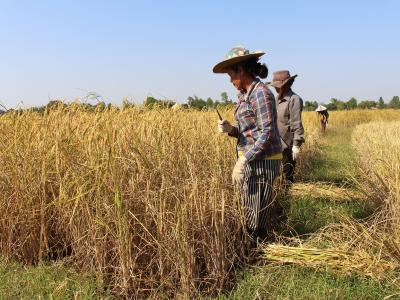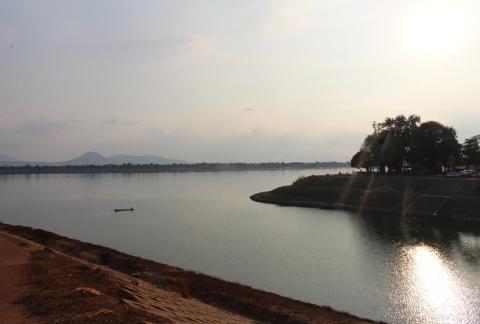Image

Project Number
Integrated Water Resource Management and Ecosystem-based Adaptation (EbA) in the Xe Bang Hieng River Basin and Luang Prabang City
Project Status
On-Going
Project Date
Project category
Category 1
Project Stage
Stage 1
Project Area of Work
Area of Work 1
Project Donor & Co-financing
Donor 1
Project Contact Details
For more information, please contact:
Phouphet Chittaphone
Database Management and Communication Officer IWRM-EbA Project
Email: [email protected]
Phouphet Chittaphone
Database Management and Communication Officer IWRM-EbA Project
Email: [email protected]
Share:

Building Climate Resilience in the Xe Bang Hieng River Basin and Luang Prabang City
Project Location
The project is implemented in two provinces in Lao PDR: Savannakhet Province and Luang Prabang City. In Savannakhet province, the project is implemented in Xe Bang Hieng River Basin covering five districts of Champone, Xonbouly, Songkhone, Sepon and Nong with more focus in three villages in each of the districts. In Luang Prabang Province, the project is implemented within the city with a focus on 5 villages.
Project Description
Project Objective
Promote integrated management of sites in the Mekong River Basin for increased climate resilience of Savannakhet Province and Luang Prabang communities vulnerable to floods and droughts, which are expected to worsen under future scenarios.
Background
Communities faces challenges from climate change including increasing floods and droughts which impact livelihoods, ecosystems and infrastructure, particularly in vulnerable regions like the Xe Bang Hieng River Basin and urban areas such as Luang Prabang city. The country’s dependence on agriculture and forestry, coupled with rapid urbanization and deforestation, has worsened the vulnerabilities of rural and urban communities.
The Xe Bang Hieng River Basin covers diverse ecosystems and livelihoods, has experienced the destructive impacts of climate change. Seasonal flooding damages agricultural lands, displaces communities, and erodes critical infrastructure, while prolonged droughts diminish water availability, degrade ecosystems and threaten food security. Similarly, Luang Prabang city, a UNESCO World Heritage Site, faces significant risks from urban flooding, which damages infrastructure, disrupts tourism and endangers cultural heritage.
To address the challenges,UNDP in partnership with the Government of Lao PDR with support from Global Environment Facility(GEF), implement the Integrated Water Resource Management and Ecosystem-Based Adaptation (EbA),designed to enhance resilience to climate-induced hazards through ecosystem restoration, community-based adaptation strategies, and improved water management practices.
Promote integrated management of sites in the Mekong River Basin for increased climate resilience of Savannakhet Province and Luang Prabang communities vulnerable to floods and droughts, which are expected to worsen under future scenarios.
Background
Communities faces challenges from climate change including increasing floods and droughts which impact livelihoods, ecosystems and infrastructure, particularly in vulnerable regions like the Xe Bang Hieng River Basin and urban areas such as Luang Prabang city. The country’s dependence on agriculture and forestry, coupled with rapid urbanization and deforestation, has worsened the vulnerabilities of rural and urban communities.
The Xe Bang Hieng River Basin covers diverse ecosystems and livelihoods, has experienced the destructive impacts of climate change. Seasonal flooding damages agricultural lands, displaces communities, and erodes critical infrastructure, while prolonged droughts diminish water availability, degrade ecosystems and threaten food security. Similarly, Luang Prabang city, a UNESCO World Heritage Site, faces significant risks from urban flooding, which damages infrastructure, disrupts tourism and endangers cultural heritage.
To address the challenges,UNDP in partnership with the Government of Lao PDR with support from Global Environment Facility(GEF), implement the Integrated Water Resource Management and Ecosystem-Based Adaptation (EbA),designed to enhance resilience to climate-induced hazards through ecosystem restoration, community-based adaptation strategies, and improved water management practices.
Project Outcomes & Impacts
Component Information
Component 1:
Developing national and provincial capacities for Integrated Catchment Management (ICM) and integrated urban Ecosystem-based Adaptation (EbA) for climate risk reduction.
The component focuses on empowering national and provincial officials and decision-makers to design and implement Integrated Catchment Management (ICM) and urban Ecosystem-based Adaptation (EbA) strategies. The initiatives aim to strengthen the climate resilience of rural and urban communities and ecosystems in Lao PDR through broad, future-ready planning and innovative tools.
Component 2:
Ecosystem-based Adaptation (EbA) interventions under an Integrated Water Resource Management (IWRM) framework, with supporting protective infrastructure and livelihood enhancement.
The component focuses on turning the integrated catchment management (ICM) framework and enabling environment established into tangible, on-the-ground Ecosystem-based Adaptation (EbA) interventions. The interventions aim to enhance the climate resilience of communities and ecosystems in Savannakhet Province, with a focus on conservation, restoration, and livelihood diversification.
Component 3:
Knowledge management and Monitoring and Evaluation (M&E)
The component ensures the long-term sustainability and scalability of project interventions by focusing on knowledge management, monitoring, and adaptive management. The component captures lessons learned during implementation, promotes scaling-up of successful approaches, and integrates community-driven monitoring systems to inform future interventions.
Key Achievements and Progress
Objective 1: Strengthening Capacities for Integrated Resource Management
• Capacity of over 200 government officials enhanced in Integrated Water Resource Management (IWRM), Geographic Information Systems (GIS),Flood and drought risk mapping and land use planning
• Completed the development of Integrated Climate-Resilient Flood Management Strategies (ICFMS) for the target districts.
• Completed Economic evaluation for the target districts in Savannakhet and Luang Prabang City
• Completed risk mapping assessment for the target villages and Luang Prabang city
• Completed the development of Integrated Climate-Resilient Flood Management Strategies (ICFMS) for the target districts.
Objective 2: Reducing Climate Risk and Promoting Resilient Livelihoods
• Improved Water Security-Constructed 16 solar-powered groundwater wells in 7 villages, benefitting 9,632 people (54% of the target village population, 5,007 female and 4,625 male).
• Restored 62 hectares of degraded ecosystems through planting 5,100 trees.
• Community Conservation Agreements (CCAs) in five villages to support climate-resilient livelihoods and land conservation initiated.
Objective 3: Enhancing Knowledge and Monitoring Systems
• Project website/knowledge hub developed l to share resources like case studies, training materials, and technical reports.
Organized public awareness campaigns for World Water Day and Environmental Day.
Community Monitoring:
Began designing community-based monitoring systems for water resources and ecosystems in 15 target villages.
Procurement underway for consultancy to implement the monitoring systems.
Baseline Surveys:
Conducted in 15 target villages to assess community awareness and knowledge on climate resilience.
Gender and Social Inclusion
Empowerment Initiatives:
32% female participation in government training sessions.
Developed training modules addressing:
Gender-based violence
Sexual harassment prevention
Women's empowerment in decision-making
Gender-sensitive targets incorporated into all project activities.
Challenges:
Cultural norms and societal barriers limited women’s participation.
Strategies include flexible training schedules and targeted outreach to increase female representation.
Key Risks and Management Actions
Grievance Redress Mechanism (GRM):
Developed and operational by August 2024, providing guidelines for resolving community concerns.
Safeguard Compliance:
Delays in environmental and social compliance assessments for groundwater wells; mitigation measures underway.
Monitoring:
Risks associated with implementation delays tracked through regular project updates.
Component 1:
Developing national and provincial capacities for Integrated Catchment Management (ICM) and integrated urban Ecosystem-based Adaptation (EbA) for climate risk reduction.
The component focuses on empowering national and provincial officials and decision-makers to design and implement Integrated Catchment Management (ICM) and urban Ecosystem-based Adaptation (EbA) strategies. The initiatives aim to strengthen the climate resilience of rural and urban communities and ecosystems in Lao PDR through broad, future-ready planning and innovative tools.
Component 2:
Ecosystem-based Adaptation (EbA) interventions under an Integrated Water Resource Management (IWRM) framework, with supporting protective infrastructure and livelihood enhancement.
The component focuses on turning the integrated catchment management (ICM) framework and enabling environment established into tangible, on-the-ground Ecosystem-based Adaptation (EbA) interventions. The interventions aim to enhance the climate resilience of communities and ecosystems in Savannakhet Province, with a focus on conservation, restoration, and livelihood diversification.
Component 3:
Knowledge management and Monitoring and Evaluation (M&E)
The component ensures the long-term sustainability and scalability of project interventions by focusing on knowledge management, monitoring, and adaptive management. The component captures lessons learned during implementation, promotes scaling-up of successful approaches, and integrates community-driven monitoring systems to inform future interventions.
Key Achievements and Progress
Objective 1: Strengthening Capacities for Integrated Resource Management
• Capacity of over 200 government officials enhanced in Integrated Water Resource Management (IWRM), Geographic Information Systems (GIS),Flood and drought risk mapping and land use planning
• Completed the development of Integrated Climate-Resilient Flood Management Strategies (ICFMS) for the target districts.
• Completed Economic evaluation for the target districts in Savannakhet and Luang Prabang City
• Completed risk mapping assessment for the target villages and Luang Prabang city
• Completed the development of Integrated Climate-Resilient Flood Management Strategies (ICFMS) for the target districts.
Objective 2: Reducing Climate Risk and Promoting Resilient Livelihoods
• Improved Water Security-Constructed 16 solar-powered groundwater wells in 7 villages, benefitting 9,632 people (54% of the target village population, 5,007 female and 4,625 male).
• Restored 62 hectares of degraded ecosystems through planting 5,100 trees.
• Community Conservation Agreements (CCAs) in five villages to support climate-resilient livelihoods and land conservation initiated.
Objective 3: Enhancing Knowledge and Monitoring Systems
• Project website/knowledge hub developed l to share resources like case studies, training materials, and technical reports.
Organized public awareness campaigns for World Water Day and Environmental Day.
Community Monitoring:
Began designing community-based monitoring systems for water resources and ecosystems in 15 target villages.
Procurement underway for consultancy to implement the monitoring systems.
Baseline Surveys:
Conducted in 15 target villages to assess community awareness and knowledge on climate resilience.
Gender and Social Inclusion
Empowerment Initiatives:
32% female participation in government training sessions.
Developed training modules addressing:
Gender-based violence
Sexual harassment prevention
Women's empowerment in decision-making
Gender-sensitive targets incorporated into all project activities.
Challenges:
Cultural norms and societal barriers limited women’s participation.
Strategies include flexible training schedules and targeted outreach to increase female representation.
Key Risks and Management Actions
Grievance Redress Mechanism (GRM):
Developed and operational by August 2024, providing guidelines for resolving community concerns.
Safeguard Compliance:
Delays in environmental and social compliance assessments for groundwater wells; mitigation measures underway.
Monitoring:
Risks associated with implementation delays tracked through regular project updates.
Project Media & Reports
Image

